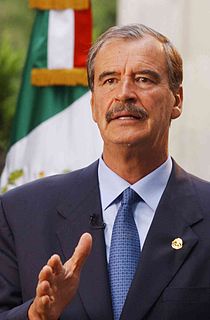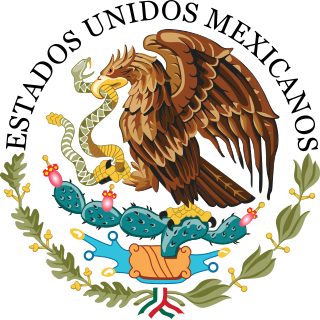
Osiel Cárdenas Guillén is a Mexican drug lord and the former leader of the Gulf Cartel and Los Zetas. Originally a mechanic in Matamoros, Tamaulipas, he entered the cartel by killing Juan García Abrego's friend and contender Salvador Gómez, after the former's arrest in 1996. As confrontations with rival groups heated up, Osiel Cárdenas sought and recruited over 30 deserters from the Grupo Aeromóvil de Fuerzas Especiales to form the cartel's armed wing. Los Zetas served as the hired private mercenary army of the Gulf Cartel.

The National Action Party, founded in 1939, is a conservative political party in Mexico, one of the three main political parties in Mexico. Since the 1980s, it has been an important political party winning local, state, and national elections. In 2000, PAN candidate Vicente Fox was elected president for a six-year term; in 2006, PAN candidate Felipe Calderón succeeded Fox in the presidency. During the period 2000-2012, both houses of the Congress of the Union contained PAN pluralities, but the party had a majority in neither. In the 2006 legislative elections the party won 207 out of 500 seats in the Chamber of Deputies and 52 out of 128 Senators. In the 2012 legislative elections, the PAN won 38 seats in the Senate, and 114 seats in the Chamber of Deputies. The members of this party are colloquially called Panistas.

Ismael "El Mayo" Zambada García, is a Mexican suspected drug lord and leader of the Sinaloa Cartel, a criminal group based in Sinaloa. Before assuming leadership of the entire cartel, he served as the logistical coordinator for the Zambada-García faction of the Sinaloa Cartel which has assisted in the exporting of cocaine and heroin into Chicago and other US cities by train, ship, jet, and narco-submarines.
Mexican literature is one of the most prolific and influential of Spanish-language literatures along with those of Spain, Argentina and Cuba. It has internationally recognized authors such as Juan Rulfo, Octavio Paz, Carlos Fuentes, Amado Nervo and several others.

The Attorney General of Mexico is the head of the Attorney General's Office and the Federal Public Ministry, an institution belonging to the Federal Government's executive branch that is responsible for the investigation and prosecution of federal crimes. The office is governed mainly by the Constitution of Mexico and the Organic Law of the Attorney General's Office. The Attorney General is a member of the President's Cabinet.

The Federal Ministerial Police is a Mexican federal agency tasked with fighting corruption and organized crime, through an executive order by President Vicente Fox Quesada. The agency is directed by the Attorney General's Office (PGR) and may have been partly modeled on the Federal Bureau of Investigation of the United States. PFM agents in action often wear masks to prevent themselves from being identified by gang leaders. PFM agents are uniformed when carrying out raids.

Mexico City's Biblioteca Vasconcelos, also known as Biblioteca Vasconcelos or else la Biblioteca Vasconcelos or la Vasconcelos and labeled by the press as the Megabiblioteca ("megalibrary"), is a library in the downtown area of Mexico City. It was dedicated to José Vasconcelos, the philosopher and former presidential candidate and former president of the National Library of Mexico. The library is spread across 38,000 square metres and had an initial planned cost of 954 million pesos. The Congress of Mexico proposed plans to reduce the budget of 2006 that included cuts for all three branches of government. National Action Party (PAN) presented an alternative budget that preserved funds for Enciclomedia and the Vasconcelos Library.
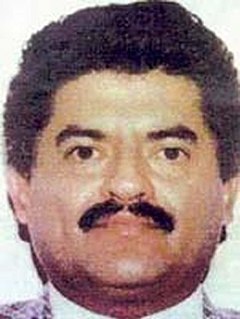
Juan José Esparragoza Moreno, commonly referred to by his alias El Azul, is a Mexican drug lord and leader of the Sinaloa Cartel, a drug trafficking organization. Originally a member of the Dirección Federal de Seguridad (DFS) police agency, he founded the Guadalajara Cartel in the 1970s along with other drug kingpins in Mexico. Following its disintegration in the late 1980s, he went on to lead the Juárez Cartel and eventually settled in the Sinaloa Cartel. He worked alongside Joaquín "El Chapo" Guzmán, once considered Mexico's most-wanted drug lord.
Vicente Carrillo Fuentes, commonly referred to by his alias El Viceroy, is a Mexican suspected drug lord and former leader of the Juárez Cartel, a drug trafficking organization. The cartel is based in Chihuahua, one of the primary transportation routes for billions of dollars' worth of illegal drug shipments entering the United States from Mexico annually. He was one of Mexico's most-wanted drug lords.
José Luis Santiago Vasconcelos was a Mexican lawyer, politician and civil servant.
Luis Fernando Sánchez Arellano, commonly referred to by the alias El Ingeniero ("The Engineer"), is a Mexican suspected drug lord and former leader of the Tijuana Cartel, a drug trafficking organization based in Tijuana, Baja California. He competed with three other major cartels, the Juárez Cartel, the Gulf Cartel, and the Sinaloa Cartel, for the illegal drug corridors into the United States.
Rafael Aguilar Guajardo was a Mexican drug lord, federal police commander of the Direccion Federal de Seguridad (DFS) in Mexico, and one of the Juárez Cartel co-founders.

Juan Pablo Ledezma is the current leader of the Mexican gang called La Línea, which is the armed wing of the drug trafficking organization known as the Juárez Cartel and is said to be the current leader of the organization.

Enrique Perea Quintanilla was a Mexican journalist, veteran crime reporter, and founder of the magazine Dos Caras, Una Verdad, a monthly investigative magazine specializing in reporting homicides and drug trafficking activities in the Mexican state of Chihuahua.
Jorge Emilio González Martínez, popularly known as El Niño Verde, is a Mexican politician affiliated with the Ecologist Green Party of Mexico (PVEM). He serves as a senator in the LXII Legislature of the Mexican Congress representing Quintana Roo. He also served as a senator from 2000 to 2006 and as a federal deputy from 1997 to 2000.

Francisco Javier García Cabeza de Vaca is a Mexican politician affiliated with the PAN, and the current Governor of Tamaulipas. García Cabeza de Vaca has previously served as a local and federal legislator, having served one term in the Chamber of Deputies and three and a half years in the Senate.

Rubén Oseguera González, commonly referred to by his alias El Menchito, is a U.S.-born Mexican suspected drug lord and former high-ranking leader of the Jalisco New Generation Cartel (CJNG), a criminal group based in Jalisco. He is the son of Nemesio Oseguera Cervantes, Mexico's most-wanted man. Under his father, he allegedly worked as the CJNG's second-in-command and managed international drug trafficking operations.
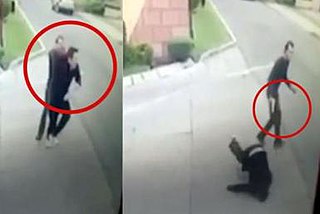
On 17 October 2016, Mexican federal judge Vicente Bermúdez Zacarías went on a morning jog near his home in Metepec, State of Mexico, an upscale community outside of Mexico City. As he was crossing a street, an unidentified gunman came up behind him and shot him at point-blank range in the head. Bermúdez Zacarías fell to the ground bleeding and was transported to a nearby hospital, but died before he was able to receive medical attention. The perpetrator fled the scene with an accomplice and reportedly hid in an abandoned lot nearby before taking off. The incident was captured through a surveillance camera and was leaked to the media the following day. The identity of the suspected gunman was discovered the following year, but both of them remain at large.
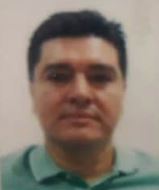
José González Valencia is a Mexican suspected drug lord and high-ranking leader of the Jalisco New Generation Cartel (CJNG), a criminal group based in Jalisco. He is part of a clan that heads a CJNG money laundering branch known as Los Cuinis. Since 2015, González Valencia reportedly held a leading role within the CJNG as the security chief of Nemesio Oseguera Cervantes, the top leader of the criminal group. Security forces in the U.S. and Mexico suspect he was also responsible for coordinating drug trafficking operations from Mexico to the U.S., Asia, and Europe.
